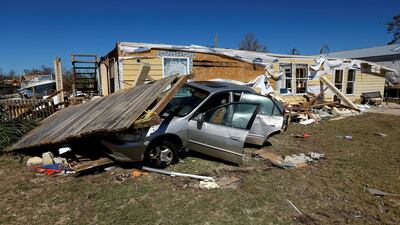The death toll from Hurricane Michael rose to at least 29 on Tuesday as crews scoured debris for hundreds of people reported missing in the Florida Panhandle, nearly a week after the storm flattened whole communities.
Hurricane Michael slammed into the northwest coastal strip of Florida last Wednesday with winds of up to 250kph.
One of the most powerful storms to hit the continent, it has killed 20 people in the Florida Panhandle, five in Virginia, three in North Carolina and one in Georgia, according to a Reuters tally of official reports.
Matthew Marchetti, co-founder of Houston-based CrowdSource Rescue, which had hundreds of volunteers on the ground, said he expects the death toll to rise as phone service is restored and roads are cleared.
_______________
Read more:
Rescue hopes turn dark in the wake of Hurricane Michael's devastation
_______________
“For every one person we have made contact with, there are probably three we haven’t,” Mr Marchetti said.
Teams from the volunteer organisation were searching for more than 1,135 people in Florida who lost contact with friends and family.
Debris and downed trees and power lines have hampered access to stranded people but the group has said a number of its missing-person reports resulted from widespread phone and power outages.
Most of those missing are from Panama City and many are elderly, disabled, impoverished, or live alone, Mr Marchetti said.
“The hardest hit in disasters are generally our most vulnerable populations,” Mr Marchetti said.
In nearby Mexico Beach, where rescue workers were using dogs to look in the debris, the number of people missing dropped to three on Tuesday, said Rex Putnal, a councillor. A day earlier, it was more than 30.
The coastal town of 1,200 residents had reported two fatalities as of Monday.
“It’s miraculous if all we have is two fatalities,” said Mexico Beach mayor Al Cathey.
Nearly 190,000 homes and businesses remained without power in southeast of the country, with residents of forced to cook on fires and barbecue grills.
At least 80 per cent of consumers in three mainly rural Panhandle counties were without electricity on Tuesday. Officials said it could be weeks before power returns to some.
Countless others in the region’s backcountry have struggled for days without running water or sanitation, awaiting help from authorities. Some have been camping in tents with the belongings they were able to salvage.
“I’m staying out here to try to keep away looters, to try to save what I can save,” said Bernard Sutton, a 64-year-old cancer patient, who has been living out of a tent and broken-down minivan in rural Fountain, Florida.
The state government is distributing ice, water and about 3 million ready-to-eat meals, according to Governor Rick Scott’s office.
Water supply was restored to some residents in Panama City on Monday but Bay County officials said it was not yet safe to drink.
“This type of living wears on you,” said Mr Putnal, the Mexico Beach city councillor. “This is about my fifth day and I’m just not used to washing clothes in a tub with no washer and dryer and eating only peanut butter and jelly sandwiches.”
Cellphone service returned to some storm-damaged areas on Tuesday, but many residents have expressed frustration at the slow recovery of wireless networks.
Federal Communications Commission Chairman Ajit Pai on Tuesday called for wireless carriers to waive bills for customers affected by the storm and allow consumers to switch carriers without penalties.

